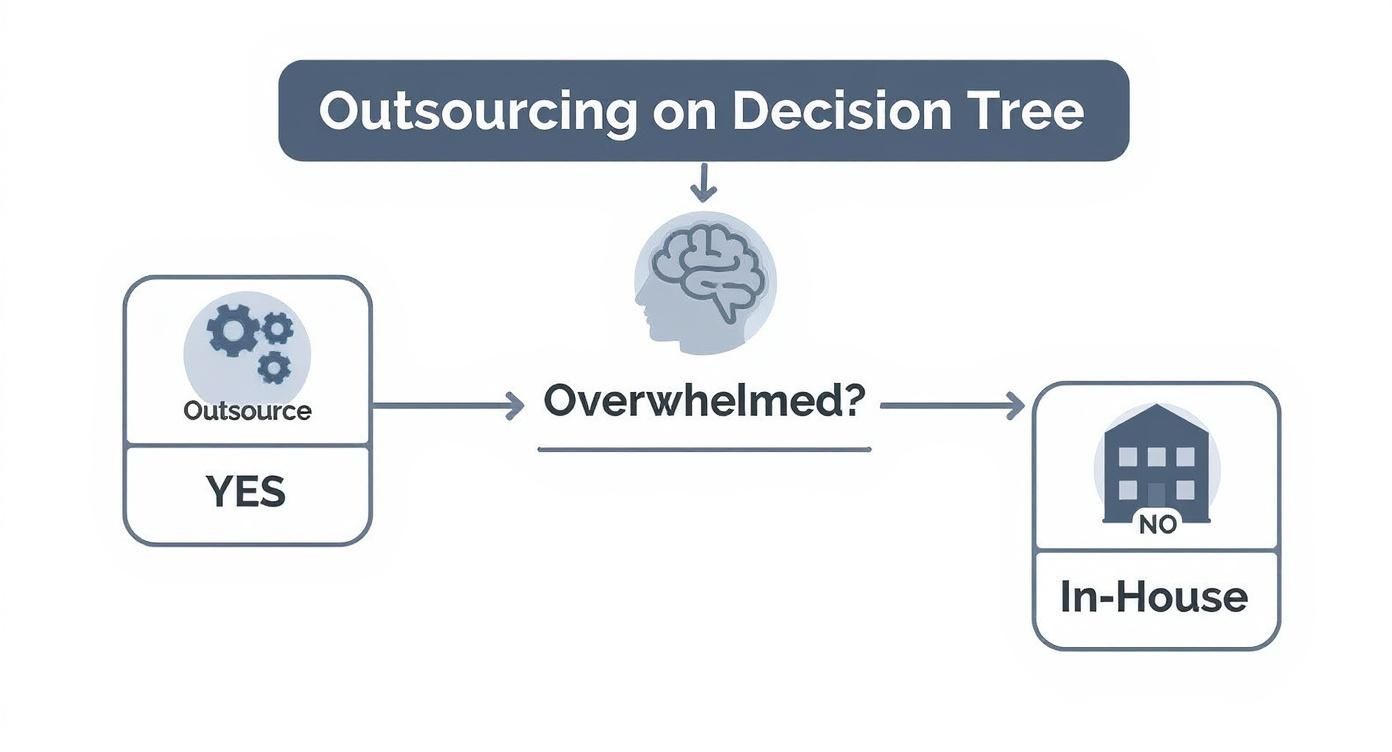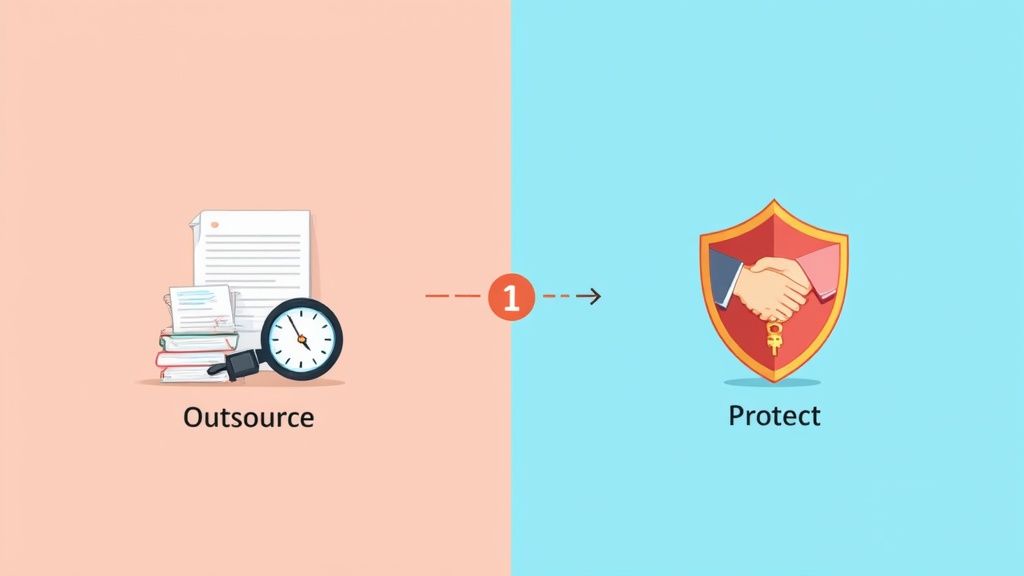
 21 minutes read
21 minutes read
Let's be honest—you didn't suffer through law school to get buried under a mountain of document review. You built a firm to practice law, not to become a full-time administrator. You’re reading this because the old “just hire more people” model feels slow, expensive, and frankly, broken. For a modern law firm, legal outsource services aren't just a nice-to-have; they're your escape hatch. It's about plugging in a surgical team of specialists without mortgaging your office ping-pong table for another full-time salary.

Think of it like this: you wouldn't hire a full-time neurosurgeon to keep on staff "just in case." You call the specialist for the specific surgery, they do their job with terrifying precision, and then they're gone. That's the whole game: delegating specific legal functions—from paralegal support and contract management to the soul-crushing nightmare of e-discovery—to an external provider who lives and breathes that stuff.
This isn’t about firing your team or chasing the cheapest possible labor overseas. It’s about using a scalpel, not a sledgehammer. The goal is to carve out the repetitive, time-sucking work that distracts your most valuable attorneys. By doing that, you unleash them to focus on high-stakes, client-facing work that actually makes you money.
Here’s a story I’ve seen a dozen times. Your firm’s finally killing it. But cases are piling up, and your star paralegal looks like they haven't slept since 2019, buried under discovery requests and boilerplate contract reviews. They’re staying late, quality is starting to fray, and you’re spending your own evenings proofreading instead of, you know, strategizing to win.
You've hit the wall. The old playbook has one answer: start the agonizingly slow and expensive process of hiring another body. Hope you enjoy spending your afternoons fact-checking resumes and running interviews—because that’s now your full-time job. And after all that, you get to spend months on training and onboarding. All while that mountain of work just keeps growing.

This is where the old model dies. It forces you into a massive, all-or-nothing commitment when all you really need is an extra 20 hours of skilled support a week to break the logjam.
Legal outsource services flip that script entirely. Instead of hiring a person, you’re buying a result. You pinpoint the pain—let's say it's document review—and plug in an external team that does nothing else, all day, every day.
Suddenly, the backlog vanishes. Your in-house team is back to focusing on what they’re good at. And you've reclaimed your time to actually run the business. The system for finding this help is the core of what is legal process outsourcing, a model built for firms that prefer to win.
This isn't some theoretical HR benefit; it's about building agility into your firm's DNA. Big case lands? Scale up support instantly. Things quiet down? Scale right back. No long-term salary, no benefits, no painful layoffs. It’s just the smarter way to grow.
When you hit that breaking point, the knee-jerk reaction is to post a job ad. Bad move. Before you do, step back and look at the true cost of an in-house hire versus an outsourced team. The numbers on the spreadsheet don't tell the whole story.
| Factor | Hiring In-House (The Old Way) | Using Legal Outsource Services (The Smart Way) |
|---|---|---|
| Upfront Cost | Recruitment fees, job ads, signing bonuses ($5,000 – $15,000+). Ouch. | $0 upfront. You pay for work, not for the privilege of hiring. |
| Ongoing Salary | Full-time salary ($50,000 – $75,000+ for a paralegal). | Pay-as-you-go hourly rates, often 40-60% less than a salaried employee's real rate. |
| Hidden Costs | Benefits, payroll taxes, 401(k), PTO, office space, new laptop. Adds 25-40% on top of salary. | Zero. The provider handles all that overhead. That’s their problem. |
| Time to Productivity | 3-6 months for recruiting, hiring, and full onboarding. If you're lucky. | 1-2 weeks. They show up trained and ready to go. No hand-holding required. |
| Scalability | Rigid. You’re stuck with a fixed capacity. Too much work? Too bad. Too little? You’re paying them anyway. | Hyper-flexible. Instantly scale support up or down based on your actual caseload. |
| Expertise | Limited to the skills of the one person you managed to hire. | Access to a whole bench of specialists in e-discovery, contract law, you name it. |
Side-by-side, it’s not even a fair fight. The traditional route is loaded with financial and operational baggage. Outsourcing gives you a direct path to getting the work done without the long-term headaches, making it a weapon for strategic growth.
The conversation around legal outsourcing has grown up. It's no longer a dirty little secret or a last-ditch move for bloated corporations. For savvy, ambitious firms, it's a core strategy to stay lean and punch way above their weight.
Let's kill a myth right now: the biggest lie we tell ourselves is that every capacity problem needs a full-time hire. You don't need another salary on the books when all you really need is an extra 15 hours of litigation support this week. That’s a variable problem. It demands a variable solution.
Hiring is a massive bet. It’s not just the salary. It’s the benefits, the taxes, the training, and the blind hope that you hired the right person for the long haul. Next thing you know, your afternoons are gone, swallowed by resume reviews and interviews instead of practicing law.
Outsourcing lets you sidestep that entire circus. It’s about surgically targeting a need—like document review or legal research—and plugging in an expert team. This frees up your core people to do what they do best: win cases and keep clients happy. You get to scale on your terms, not the terms of some rigid, outdated hiring model.
The market data screams the same story. The Legal Process Outsourcing industry is on a tear, projected to smash $22.14 billion by 2025. This isn't a trend; it's a fundamental shift. In fact, a whopping 79% of firms that outsource report better efficiency and happier clients. You can explore the data behind legal outsourcing growth if you don't believe me.

The real win isn't just saving money. It's gaining agility. It's the freedom to take on a monster e-discovery project that would normally bury your team, or go toe-to-toe with a bigger competitor, all without having to sell the office coffee machine.
Here’s another hard truth: your firm can't afford to keep a full-time specialist for every niche legal area on the payroll. It’s insane to have an IP docketing wizard, an e-discovery guru, and a contract law expert all on standby "just in case."
This is where the power of legal outsource services really clicks. You aren't just hiring another paralegal; you're plugging into a curated network of pre-vetted specialists. We've talked about the different kinds of legal outsourcing services before, but the advantage is always the same: you get top-tier talent, exactly when you need it.
Think about it. You land a high-stakes case that requires an expert in a specific type of compliance. Instead of a frantic, expensive search for a new hire, you just tap your outsourced partner. They assign a pro with the exact experience you need, but only for that project. Case wraps up, engagement ends. No overhead, no strings attached.
It’s like having a bench deeper than the Lakers in the 80s, but on a startup budget. This lets smaller firms offer a range of services that used to be the exclusive playground of the big guys. It's not about being cheap; it's about being lethally smart.
So, you're sold on the idea. Good. Now for the hard part: figuring out how. Not all outsourcing models are created equal, and picking the wrong one is like showing up to a deposition in swim trunks—it just doesn't work. This is where most firms stumble, so let’s cut the jargon.
Before you even look at vendors, take a hard look in the mirror. This simple decision tree can map out that first crucial choice.

As you can see, that drowning feeling is what forces the decision. Do you keep trying to bail water, or is it time to call for a bigger boat?
This is what most people picture: taking high-volume, repetitive tasks—document review, transcription, data entry—and sending them to a team in a place like India or the Philippines. Let's be real, the motivation is singular: slashing costs.
The pitch is always seductive, with promises of cutting labor costs by 60-70%. For the right kind of mindless work, it can be a home run. But here's the reality check: you get what you pay for. The trade-off is often less direct oversight, time zone headaches, and a constant, low-level anxiety about quality control. If you go this route, you better have iron-clad processes and a manager ready to babysit.
Next up is keeping the work in-country. You're still handing off tasks, but the provider operates under the same laws and, crucially, in a similar time zone. Communication is easier, oversight feels more direct, and you can sleep a little better knowing they're not on the other side of the planet.
The catch? It costs more. A lot more. You’re not getting that global labor arbitrage, so the savings are modest. This model is perfect for work that’s too sensitive to ship overseas but still doesn't justify a full-time hire. Think of it as the "belt and suspenders" approach—safer, but you pay a premium for that peace of mind.

The global legal outsourcing market is exploding, projected to hit a mind-boggling $105.66 billion by 2032. While offshore grabs the biggest slice of revenue today, both models are growing as firms realize a one-size-fits-all strategy is for rookies.
Now we get to the interesting part. Alternative Legal Service Providers (ALSPs) are the newcomers rewriting the rules. These aren't just glorified temp agencies; they are tech-first companies that blend legal expertise with smart software and slick processes. Think of them less as a vendor and more as a strategic weapon.
ALSPs don’t just throw people at a problem—they re-engineer the entire workflow. They use automation for contract analysis, AI for e-discovery, and slick platforms to manage projects. The result is a service that's not just cheaper, but often faster and more accurate than your in-house team could ever be. Toot, toot! This is where we play.
As you build your strategy, tech becomes central. To see what's out there, check out these cloud-based law firm software options. This is the path for firms looking to build a real competitive edge, not just trim a few bucks from payroll. It's where the industry is going.

Alright, let's get tactical. Once you're bought into legal outsourcing services, your next move isn't to call vendors. It's to draw a bright, uncrossable line in the sand between what you delegate and what you guard with your life.
Get this right, and you unlock ridiculous efficiency. Get it wrong? You risk compromising the very soul of your firm. I’ve seen both happen. It’s not pretty.
Start with the easy wins. These are the high-volume, low-complexity tasks that suck up your team's time but don't require the strategic brain of a senior partner. This is your "scale and delegate" pile.
We're talking about the grunt work—the necessary evils that bog down your best people. Offloading this isn't just a smart move; it's a morale booster.
These tasks are ideal because they're process-driven. You can create clear guidelines, set firm deadlines, and measure the output without much guesswork. It's the perfect way to test the waters with a new partner.
Once you’ve nailed the basics, you can start delegating more sophisticated work. This is where you see serious ROI, but it requires more trust and deeper integration.

The key here is to treat your provider like an extension of your team, not a vending machine. This isn't a "fire and forget" mission. It requires constant communication, regular check-ins, and a partner who gets the gravity of the work.
To help you visualize this, here’s a simple framework I use.
This table offers a clear guide to help your firm decide which tasks are prime for outsourcing versus those that should remain in-house, based on their complexity and strategic importance.
| Task Type | Ideal for Outsourcing? | Key Considerations |
|---|---|---|
| High-Volume, Repetitive Tasks | Yes (Prime Candidate) | Is it process-driven? Can quality be easily measured? (e.g., document review, data entry) |
| Specialized, Non-Core Functions | Yes (Strong Candidate) | Does it require specific expertise or tech you lack? (e.g., e-discovery, IP docketing) |
| Strategic & Client-Facing | No (Keep In-House) | Does it directly involve client counsel or firm strategy? (e.g., case strategy, final advice) |
| Core Legal Analysis | No (Keep In-House) | Is this the "secret sauce" the client is paying for? (e.g., crafting core legal arguments) |
The goal is to outsource tasks, not responsibility. This matrix helps you protect what matters while gaining efficiency where it counts.
Now for that bright red line. Some functions are so central to your firm's identity and ethical duties that outsourcing them is malpractice waiting to happen. This is your secret sauce.
Guard this list with your life:
Protecting these functions isn't about control. It’s about knowing where your true value lies and never, ever compromising it.
Choosing a provider is like a business marriage. The courtship is full of promises, but a bad breakup is messy and expensive. Let's cut the sales crap and talk about how to find a real partner, not just a vendor who will cash your checks and disappear.
This isn't a race to the bottom on price. This is about finding a team that treats your work with the same urgency you do. You're looking for an extension of your own firm, and that requires a vetting process that goes way beyond a glossy PDF.
Before you talk about anything else, you nail down the hard facts. A provider's security credentials are the foundation. If they can’t protect your data, nothing else matters.
Ask them directly:
If they hesitate on any of these, walk away. It's that simple. Outsourcing a task doesn't let you outsource your ethical duty to protect client data.
I can't scream this loud enough: never sign a long-term contract based on a good sales pitch. You have to see them in action. I call this “the $500 hello”—a small, paid pilot project designed to test their real-world chops before you commit.
Don't give them a throwaway task. Assign a real piece of work with a clear deliverable and a tight deadline. A small-scale document review, a specific research memo. Pay them for it. This signals you’re serious and ensures they put their A-team on it.

This small investment is the best due diligence money can buy. It will tell you more about their competence and communication style than a dozen reference calls ever could.
Watch how they handle it. Do they ask smart questions? Do they hit the deadline without drama? Is the final work clean and ready to use? This trial is your crystal ball. For tips on structuring a pilot, our guide on the outsourcing legal process offers a solid framework.
Finally, once the tech is solid, you assess the humans. You can hire the most brilliant team on the planet, but if they’re impossible to work with, the partnership is doomed.
During your calls, ask yourself:
Finding the right provider for legal outsource services is more matchmaking than procurement. It takes work, but getting it right adds a powerful engine to your firm’s growth. Getting it wrong is just a fast-track to headaches and wasted money. Choose wisely.

If your picture of legal outsourcing is a room full of people manually redacting documents, you’re about a decade late to the party. The game has changed. Forget just finding cheap labor; the new frontier is about finding smarter solutions.
The real earthquake isn't just a new business model; it’s the rise of Alternative Legal Service Providers (ALSPs). These guys aren't selling billable hours. They're selling tech-powered efficiency. They’re a hybrid of a law firm, a tech company, and a process engineering consultancy.
This new breed doesn't just throw bodies at a problem. They use custom platforms to manage workflows and, increasingly, generative AI to do the heavy lifting. We’re talking AI that performs initial doc review, summarizes depositions, and even runs predictive analysis. It's not sci-fi; it's what winning firms are doing on a Tuesday.
This isn't some niche trend. The ALSP market is a juggernaut. As of 2025, ALSPs command a $28.5 billion slice of the legal market. That number is growing at an 18% compound annual rate, which tells you exactly where the smart money is flowing.
Why? Simple. ALSPs are using tech like generative AI to become indispensable. Partnering with a tech-forward ALSP gives you an instant leg up. Suddenly, you’re not just outsourcing tasks; you’re plugging into a sophisticated operational machine that’s faster, more accurate, and smarter than anything you could build yourself.
So what does this actually look like? Practically speaking, an AI agent for legal contract analysis can automate a task that used to be a prime candidate for mind-numbing manual outsourcing.
Here’s where ALSPs are putting AI to work right now:

But here’s the crucial part: it’s not just about the tech. It’s about the human expertise wielding it. The best ALSPs have legal pros who train, manage, and quality-check the AI’s output. They’re the expert pilots in the cockpit of the advanced jet.
Of course, there's a lot of hype. Every provider now slaps "AI-powered" on their website. The key is to find partners who can show you exactly how their tech translates into better results for your firm. This isn't about replacing lawyers; it's about giving them superpowers. And frankly, if you’re not arming your team, you’re already falling behind.
Alright, you’re still here, which means you’re serious. But the nagging questions are probably bubbling up. Let’s hit the big ones head-on. This is the stuff founders ask when the door is closed.
Let's be blunt: it's as secure as you make it. Handing sensitive data to a vendor without doing your homework is just plain stupid. Reputable legal outsource services operate under ironclad NDAs and adhere to serious security standards like ISO 27001.
But the burden is on you. You have to grill them on their security.

If your potential partner can't give you a confident, detailed breakdown of how they protect attorney-client privilege and comply with your jurisdiction's ethical rules, run. Don't walk. Run.
Vetting security isn't optional; it's a core part of your own ethical duty.
That's your call, and it depends on the work. For back-office drudgery like document management, telling the client is usually unnecessary noise. They care about the result, not who organized the files.
But for substantive legal work, transparency is your best friend. Don't hide it. Frame it as a strategic advantage: you're leveraging a specialized team to deliver a better, more efficient result. Most clients appreciate a firm that’s smart with their money.
Just make sure you check your local bar association's rules first.
You don't "set it and forget it." That’s how you get burned. Treating your outsourced team like a black box is a recipe for disaster. This requires active management, just like any other part of your firm.
Here’s the battle-tested playbook:
Treat them like an extension of your team. The moment you see them as just another vendor, you’ve already lost.